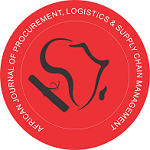| 1Lord Emmanuel Yamoah | 2Isaac Kofi Yornu
Abstract The dynamics of the present day competitive environment places increasing pressures on organizations to reinvent themselves continuously (McAdam & McCormak 2001), to adopt the supply chain management philosophy (Tracy & Tan 2001), develop long-term strategic partnerships with a few competent and innovative suppliers and collaborate with them in non-core process outsourcing in order to maintain or improve overall organizational performance and generate sustainable competitive advantage. One of the most important activities in any organization today pertains to procurement of materials and services that it requires in order to convert raw material into finished products that are useful for the customers. Sourcing has become strategic on two counts; operational and economic. Operationally there is a growing importance of sourcing due to several developments. An analysis of the cost structure of manufactured goods over the last 30 years reveals that increasingly organizations spend over 70% on raw materials and purchased components and services. This puts a special emphasis on procurement and sourcing. Further there is a significant change in the trading partner relationships. From an era of “independence” between the supplier and the buyer, we have transformed into an era of “mutual dependence” and even further into a “state of interdependence”. Finally, the increasing cost pressure that organizations face translate directly into reducing the input cost of materials and components even while increasing the quality and performance of these components. Clearly these operational considerations have pushed the importance of sourcing in organizations. Keywords: Potential Suppliers, Selection Process, Supply Chain Management |
UPDATES
- Total Quality Management Practices, Organisational Culture and Firm Performance; Service or Product Innovation
- Process and Supplier Capability, Collaboration in New Product Development and Competitive Advantage: The Moderating Effect of Research and Development Capability
- Demand and Supply Characteristics, Supply Chain Strategy and Business Performance
- The Effect of Transactional Costs and Competitive Tendering on Public Procurement Performance
- The Role of Organizational Culture as a Moderating Factor in the Relationship Between E-Procurement Adoption, Procurement Performance, and Value for Money
- The Influence of Corporate Governance on Strategic Procurement and Competitive Advantage
- Senior Management’s Influence on Supplier Selection and Procurement Performance
- Enforcing Ethical Codes of Conduct in Procurement and Its Impact on Public Procurement Performance in Ghana
- The Influence of Supplier Relationship Management on Supply Performance: The Moderating Effect of Employee Commitment
- Transport Cost Minimization and Performance of State-Owned Transport Companies: The Role of Innovative Capability

